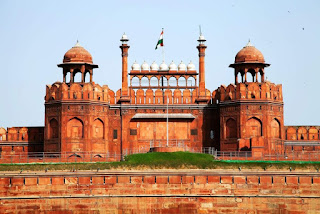Attractions and Places to Visit in Jaipur
Jaipur is the capital of India’s Rajasthan state. It evokes the
royal family that once ruled the region and that, in 1727, founded what is now
called the Old City, or “Pink City” for its trademark building color. At the center of its
stately street grid (notable in India) stands the opulent, colonnaded City
Palace complex. With gardens, courtyards and museums, part of it is still a
royal residence.
1. Hawa Mahal, Jaipur Overview
The massive edifice of Hawa
Mahal stands at the intersection of the main road in Jaipur, Badi Chaupad. It
is regarded as the signature building of the city and was built by Maharaja
Sawai Pratap Singh in the year 1799. Hawa Mahal derives its name from its
unique structure, which is a mesh of small windows that allowed cool wind to
enter the palace and hence kept the palace comfortable during the hot summer
months.
2. City Palace, Jaipur Overview
The magnificent City Palace is
one of the most famous tourist attractions in the city of Jaipur, Rajasthan.
Built by Maharaja Sawai Jai Singh during the years 1729 to 1732, the vast
complex of the palace occupied one seventh of the walled city. The imposing
complex of the palace used to be the seat of the Maharaja of Jaipur.
3. Amber Fort, Jaipur Overview
Cradled on the top of the
Aravali Hill and forming a beautiful reflection across the Maotha Lake, lies
the Amber Fort. An architectural masterpiece and with significant reference in
the Indian history, it is visited by over five thousand tourists daily. Only
eleven kilometres away from the capital city of Jaipur, Amber Fort is clad in
pink and yellow sandstone and is a part of an extensive complex.
4. Nahargarh Fort, Jaipur Overview
Located in the Pink City of
Jaipur is the Nahargarh Fort, which is one of the many countless
palaces and beautiful historic buildings that speak of the magnificent and rich
history of this city. Embellished with delicate carvings and stonework,
the Nahargarh Fort is an impregnable fortification that together with its
two neighbouring forts, Amer Fort and Jaigarh Fort, once stood as the strong
defence of Jaipur city. Standing tall on Aravalli Hills, the Fort was
built by Maharaja Sawai Jai Singh II in the year 1734 as a retreat. It was
originally called Sudarshangarh Fort, but was later renamed to Nahargarh Fort
which literally translated to "The Abode of Tigers". With some
breathtaking views of the city, the Nahargarh Fort is known for its extended
wall which connects it to Jaigarh Fort.
5. Albert Hall Museum, Jaipur Overview
Situated in the Ram Niwas
Garden of Jaipur, the great Albert Hall is the oldest museum of Rajasthan.
Standing as a perfect epitome of Indo-Saracenic architecture, the building is
named after the Prince of Whales, Albert Edward. Also called as the Government
Central Museum, it has an extensive collection of artefacts brought from the
different regions of the world which makes it a hub of imparting knowledge on
Indian history.
6. Jantar Mantar, Jaipur Overview
Located near the City Palace in
the regal city of Jaipur, Jantar Mantar is the largest stone astronomical
observatory in the world. This ancient study boasts of nineteen
instruments built out of stone and brass and was built by Raja Sawai Jai Singh
in 1727-33. The intelligent construction and placement of these instruments
allowed the observer to note the position of heavenly bodies with their naked
eye alone.
7. Jal Mahal, Jaipur Overview
In the outskirts of Jaipur,
away from the mayhem of the city, lies the splendid and tranquil Jal Mahal. It
is also called as the Water Palace because of its location in the middle of the
Man Sagar Lake in Jaipur. This low rise symmetrical Palace was once a shooting
lodge for the Maharajas and now fascinates many visitors from all over the
world.




Comments
Post a Comment